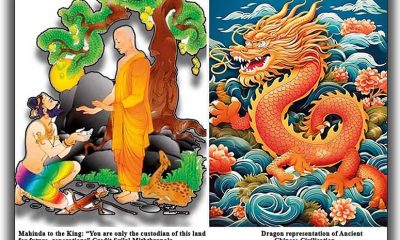Features
A collective identity as human beings a must for ending global ethno-religious conflicts
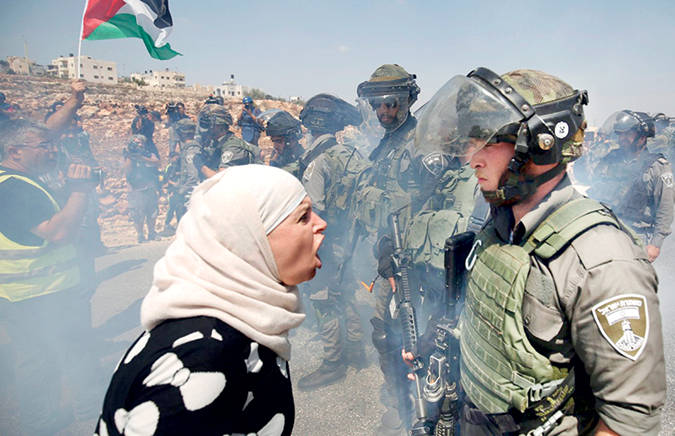
by Bedgar Perera
I am quoting below, from a video clip where an unidentified person speaks about the Israeli-Palestinian conflict in brief and what he sees as a humanitarian solution for it, which would be applicable to any such conflicts world over.
Let me quote:
“If you identify as Jewish, you feel more sympathy for the Israeli deaths. If you identify as Muslim you feel more for the Palestinians.
“Albert Einstein said nationalism is an infantile disease and the truth in that statement explains not only conflict in Israel, but all over the world.
“The moment you adopt a country, religion or set of beliefs as your primary identity, is the moment dehumanization begins in your own mind. You automatically feel more love for those who belong to your identity calling them ‘my people’ , even though we all are one people.
Identified groups usually claim to be in sole possession of the truth, and therefore killing others in pursuit of the truth is justified. War is a symptom of the disease of being too attached to an identity, but it starts in here (brain), the moment you lose connection with humanity as a whole
.WE CAN KEEP OUR BELIEFS AND FLAGS, BUT IF WE WANT PEACE, WE HAVE TO BUILD A COLLECTIVE IDENTITY AS HUMAN BEINGS (emphasis added).”
I shared the aforesaid video with some friends and two comments I received are quoted below, because of their high relevance here.
“This has been the universal truth. He puts it very succinctly” – Dr.Asoka Marasinghe, Texas,USA
“Human race is yet to understand the simple truth, although fluent in so called advanced technologies” – Dr.Sarath Weerasena, Peradeniya
The foregoing indicates the futility of ethno-religious conflicts world over and that nationalism which gets inbuilt in the human mind owing to identification with a particular country, religion or set of beliefs, mostly from the time of birth of an individual. This has been termed an “infantile disease” by none other than Albert Einstein, meaning that it is inborn from birth. This so called disease explains not only the current Palestinian-Israeli conflict, but also such conflicts all over the world. War is a symptom of this disease “of being too attached to an identity”, and in the process losing connection with humanity, with the human mind getting dehumanized along with the exit of the humane touch.
These conflicts have been going on over the past decades and centuries in this world as recorded in history, with millions getting killed, in spite of the world advancing technologically to the extent of even having developed artificial intelligence. The sheer killing of thousands of innocent humans in the midst of all material advances continues even now, at the push of a button by a fighter/bomber pilot which has the potential to blow into bits even big apartment buildings with hundreds or thousands of people sleeping at times, as shown on TV screens nowadays.
This happens in spite of the noble religions of people, all of which advocate living according to principles of natural justice, with love of one another, and absolutely no hatred to all and refraining from all crimes including murder which is the most heinous crime that a man could commit which has now become a very common day to day occurrence.
Through sheer interest, I have talked to quite a number of people of many levels, about their views on bringing about a solution to these senseless wars based on ethnic and religious issues, as Sri Lanka too has gone through such episodes which have not yet found any lasting solution with embers glowing within doused fires waiting to ignite any moment.
While some people are not bothered to talk about these issues saying it is a waste of time to do so, there are many including academics, who say that ” these are very complex issues which cannot be solved easily and that they will go on, so long as the humans exist.”. Worst is that even top diplomats with conflict resolution a major mandate, have been heard or seen referring to the so called complexity of these conflicts and the serious problems involved in arriving at a solution without ever giving a possible lasting remedy to the whole issue.
Perhaps they, including UN diplomats thrive on these issues with all their perks, high emoluments, attractive life pensions on retirement, while attending hi fi conferences, writing lengthy reports and last but not least attending diplomatic parties in plush hotels, at no cost to themselves, with all expenses being indirectly taken care of through the public purse of somebody somewhere or other.
Many issues in life some people blindly consider are too complex to solve and are hence pushed under the carpet may have unconsidered solutions that are not rocket science. Such tendencies of indecisiveness can move up the ladder from the individual level to communities in villages, cities, provinces , countries and the whole world.
In such a scenario, the anonymous speaker referred to above has a point worth pondering when he says: “We can keep our beliefs and flags, but it we want peace, we have to build a collective identity as human beings.”
The solution appears to be lying in building a “collective identity as human beings”. Of course even though the solution lies there, as it involves an attitudinal change in the human mind on a mass scale, it cannot be achieved overnight. But a start has to be made and thinking aloud, it can be realized that the best world forum to effectively start discussion about this will be the United Nations Organization (UNO), which was formally established for conflict resolution. But conflicts and wars rage the world over even while the UN sessions are ongoing.
There is no reason why the UNO which has its General Assembly (UNGA) annually with many world leaders gathering to discuss burning global issues, cannot focus on a theme like this and start the ball rolling for a universal move towards a “collective identity as human beings.”
If we want peace, as keeping peace is one of the UNO’s key mandates, this noble idea can be further discussed and adopted in due course as a UN Resolution. All member countries should concur as there is no logical reasoning for any member country to oppose such a Resolution.
The next step is for the political leaders of UN member countries to give an undertaking to abide by and spread the message to their citizen at large for acceptance, and actual implementation, since in some countries ethnic and religious considerations are included in their constitutions, giving more rights to some groups than others. All this, of course, would take time and is easier said that done. There are many adopted UN resolutions that remain unimplemented. Lip service alone will not do.
One could speculate that the aforesaid simplistic strategy is too ambitious and far-fetched to achieve worldwide acceptance, leave alone implementation, of adopting the proposed premise of a collective identity as human beings if we want peace. It is surely a long haul But a start must be made somewhere.
In order to add weight to the futility of ethno religious conflicts stressed in the foregoing, I quote from a well written article by Susantha Hewa, published in The Island of October 30, 2023, titled “Insanity of identity”, questioning the very basis of killing so many people based on ethno religious conflict during the current Israeli-Palestinian war.
“Isn’t this an ideal moment to look at our toxic identities that are mere cultural constructs? Almost all instances of plain butchery of one group by another group of humans are triggered by the fake identities imposed on us by tradition and culture, and the two most tenacious labels we carry throughout our life are our fake identities of ‘ethnicity ‘ and ‘religion’. It is the feelings of ‘self’ and ‘other’ created and nurtured in us by the socially sanctioned imposition of an ethnicity and a religion that has poisoned all human minds and engendered cruelty.”
It is hoped that the views expressed here will motivate those with interest to interact among one another regarding this vital issue for human survival, in order that useful ideas on tackling this grave problem, without letting conflicts take their course, killing thousands, will eventually reach where it matters. This is only a small attempt towards that end.
Email – bedgarperera@gmail.com
Features
Following the Money: Tourism’s revenue crisis behind the arrival numbers – PART II

(Article 2 of the 4-part series on Sri Lanka’s tourism stagnation)
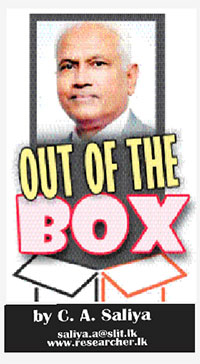 If Sri Lanka’s tourism story were a corporate income statement, the top line would satisfy any minister. Arrivals went up 15.1%, targets met, records broke. But walk down the statement and the story darkens. Revenue barely budges. Per-visitor yield collapses. The money that should accompany all those arrivals has quietly vanished, or, more accurately, never materialised.
If Sri Lanka’s tourism story were a corporate income statement, the top line would satisfy any minister. Arrivals went up 15.1%, targets met, records broke. But walk down the statement and the story darkens. Revenue barely budges. Per-visitor yield collapses. The money that should accompany all those arrivals has quietly vanished, or, more accurately, never materialised.
This is not a recovery. It is a volume trap, more tourists generating less wealth, with policymakers either oblivious to the math or unwilling to confront it.
Problem Diagnosis: The Paradox of Plenty:
The numbers tell a brutal story.
Read that again: arrivals grew 15.1% year-on-year, but revenue grew only 1.6%. The average tourist in 2025 left behind $181 less than in 2024, an 11.7% decline. Compared to 2018, the drop is even sharper. In real terms, adjusting for inflation and currency depreciation, each visitor in 2025 generates approximately 27-30% less revenue than in 2018, despite Sri Lanka being “cheaper” due to the rupee’s collapse. This is not marginal variance. This is structural value destruction. (See Table 1)

The math is simple and damning: Sri Lanka is working harder for less. More tourists, lower yield, thinner margins. Why? Because we have confused accessibility with competitiveness. We have made ourselves “affordable” through currency collapse and discounting, not through value creation.
Root Causes: The Five Mechanisms of Value Destruction
The yield collapse is not random. It is the predictable outcome of specific policy failures and market dynamics.
1. Currency Depreciation as False Competitiveness
The rupee’s collapse post-2022 has made Sri Lanka appear “cheap” to foreigners. A hotel room priced at $100 in 2018 might cost $70-80 in effective purchasing power today due to depreciation. Tour operators have aggressively discounted to fill capacity during the crisis recovery.
This creates the illusion of competitiveness. Arrivals rise because we are a “bargain.” But the bargain is paid for by domestic suppliers, hotels, transport providers, restaurants, staff, whose input costs (energy, food, imported goods) have skyrocketed in rupee terms while room rates lag in dollar terms.
The transfer is explicit: value flows from Sri Lankan workers and businesses to foreign tourists. The tourism “recovery” extracts wealth from the domestic economy rather than injecting it.
2. Market Composition Shift: Trading European Yields for Asian Volumes
SLTDA data shows a deliberate (or accidental—the policy opacity makes it unclear) shift in source markets. (See Table 2)

The problem is not that we attract Indians or Russians, it is that we attract them without strategies to optimise their yield. As the next article in this series will detail, Indian tourists average approximately 5.27 nights compared to the 8-9 night overall average, with lower per-day spending. We have built recovery on volume from price-sensitive segments rather than value from high-yield segments.
This is a choice, though it appears no one consciously made it. Visa-free entry, aggressive India-focused marketing, and price positioning have tilted the market mix without any apparent analysis of revenue implications.
3. Length of Stay Decline and Activity Compression
Average length of stay has compressed. While overall averages hover around 8-9 nights in recent years, the composition matters. High-yield European and North American tourists who historically spent 10-12 nights are now spending 7-9. Indian tourists spend 5-6 nights.
Shorter stays mean less cumulative spending, fewer experiences consumed, less distribution of value across the tourism chain. A 10-night tourist patronises multiple regions, hotels, guides, restaurants. A 5-night tourist concentrates spending in 2-3 locations, typically Colombo, one beach, one cultural site.
The compression is driven partly by global travel trends (shorter, more frequent trips) but also by Sri Lanka’s failure to develop compelling multi-day itineraries, adequate inter-regional connectivity, and differentiated regional experiences. We have not given tourists reasons to stay longer.
4. Infrastructure Decay and Experience Degradation
Tourists pay for experiences, not arrivals. When experiences degrade, airport congestion, poor road conditions, inadequate facilities at cultural sites, safety concerns, spending falls even if arrivals hold.
The 2024-2025 congestion at Bandaranaike International Airport, with reports of tourists nearly missing flights due to bottlenecks, is the visible tip. Beneath are systemic deficits: poor last-mile connectivity to tourism sites, deteriorating heritage assets, unregistered businesses providing sub-standard services, outbound migration of trained staff.
An ADB report notes that tourism authorities face resource shortages and capital expenditure embargoes, preventing even basic facility improvements at major revenue generators like Sigiriya (which charges $36 per visitor and attracts 25% of all tourists). When a site generates substantial revenue but lacks adequate lighting, safety measures, and visitor facilities, the experience suffers, and so does yield.
5. Leakage: The Silent Revenue Drain
Tourism revenue figures are gross. Net foreign exchange contributions after leakages, is rarely calculated or published.
Leakages include:
· Imported food, beverages, amenities in hotels (often 30-40% of operating costs)
· Foreign ownership and profit repatriation
· International tour operators taking commissions upstream (tourists book through foreign platforms that retain substantial margins)
· Unlicensed operators and unregulated businesses evading taxes and formal banking channels
Industry sources estimate leakages can consume 40-60% of gross tourism revenue in developing economies with weak regulatory enforcement. Sri Lanka has not published comprehensive leakage studies, but all indicators, weak licensing enforcement, widespread informal sector activity, foreign ownership concentration in resorts, suggest leakages are substantial and growing.
The result: even the $3.22 billion headline figure overstates actual net contribution to the economy.
The Way Forward: From Volume to Value
Reversing the yield collapse requires
systematic policy reorientation, from arrivals-chasing to value-building.
First
, publish and track yield metrics as primary KPIs. SLTDA should report:
· Revenue per visitor (by source market, by season, by purpose)
· Average daily expenditure (disaggregated by accommodation, activities, food, retail)
· Net foreign exchange contribution after documented leakages
· Revenue per room night (adjusted for real exchange rates)
Make these as visible as arrival numbers. Hold policy-makers accountable for yield, not just volume.
Second
, segment markets explicitly by yield potential. Stop treating all arrivals as equivalent. Conduct market-specific yield analyses:
· Which markets spend most per day?
· Which stays longest?
· Which distributes spending across regions vs. concentrating in Colombo/beach corridors?
· Which book is through formal channels vs. informal operators?
Target marketing and visa policies accordingly. If Western European tourists spend $250/day for 10 nights while another segment spends $120/day for 5 nights, the revenue difference ($2,500 vs. $600) dictates where promotional resources should flow.
Third
, develop multi-day, multi-region itineraries with compelling value propositions. Tourists extend stays when there are reasons to stay. Create integrated experiences:
· Cultural triangle + beach + hill country circuits with seamless connectivity
· Themed tours (wildlife, wellness, culinary, adventure) requiring 10+ days
· Regional spread of accommodation and experiences to distribute economic benefits
This requires infrastructure investment, precisely what has been neglected.
Fourth
, regulations to minimise leakages. Enforce licensing for tourism businesses. Channel bookings through formal operators registered with commercial banks. Tax holiday schemes should prioritise investments that maximise local value retention, staff training, local sourcing, domestic ownership.
Fifth
, stop using currency depreciation as a competitive strategy. A weak rupee makes Sri Lanka “affordable” but destroys margins and transfers wealth outward. Real competitiveness comes from differentiated experiences, quality standards, and strategic positioning, not from being the “cheapest” option.
The Hard Math: What We’re Losing
Let’s make the cost explicit. If Sri Lanka maintained 2018 per-visitor spending levels ($1,877) on 2025 arrivals (2.36 million), revenue would be approximately $4.43 billion, not $3.22 billion. The difference: $1.21 billion in lost revenue, value that should have been generated but wasn’t.
That $1.21 billion is not a theoretical gap. It represents:
· Wages not paid
· Businesses not sustained
· Taxes not collected
· Infrastructure not funded
· Development not achieved
This is the cost of volume-chasing without yield discipline. Every year we continue this model; we lock in value destruction.
The Policy Failure: Why Arrivals Theater Persists
Why do policymakers fixate on arrivals when revenue tells the real story?
Because arrivals are politically legible. A minister can tout “record tourist numbers” in a press conference. Revenue per visitor requires explanation, context, and uncomfortable questions about policy choices.
Arrivals are easy to manipulate upward, visa-free entry, aggressive discounting, currency depreciation. Yield is hard, it requires product development, market curation, infrastructure investment, regulatory enforcement.
Arrivals theater is cheaper and quicker than strategic transformation. But this is governance failure at its most fundamental. Tourism’s contribution to economic recovery is not determined by how many planes land but by how much wealth each visitor creates and retains domestically. Every dollar spent celebrating arrival records while ignoring yield collapse is a waste of dollars.
The Uncomfortable Truth
Sri Lanka’s tourism “boom” is real in volume, but it is a value bust. We are attracting more tourists and generating less wealth. The industry is working harder for lower returns. Margins are compressed, staff are paid less in real terms, infrastructure decays, and the net contribution to national recovery underperforms potential.
This is not sustainable. Eventually, operators will exit. Quality will degrade further. The “affordable” positioning will shift to “cheap and deteriorating.” The volume will follow yield down.
We have two choices: acknowledge the yield crisis and reorient policy toward value creation or continue arrivals theater until the hollowness becomes undeniable.
The money has spoken. The question is whether anyone in power is listening.
Features
Misinterpreting President Dissanayake on National Reconciliation
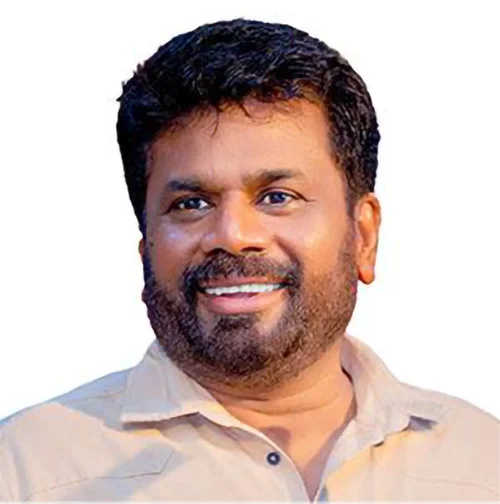
President Anura Kumara Dissanayake has been investing his political capital in going to the public to explain some of the most politically sensitive and controversial issues. At a time when easier political choices are available, the president is choosing the harder path of confronting ethnic suspicion and communal fears. There are three issues in particular on which the president’s words have generated strong reactions. These are first with regard to Buddhist pilgrims going to the north of the country with nationalist motivations. Second is the controversy relating to the expansion of the Tissa Raja Maha Viharaya, a recently constructed Buddhist temple in Kankesanturai which has become a flashpoint between local Tamil residents and Sinhala nationalist groups. Third is the decision not to give the war victory a central place in the Independence Day celebrations.
Even in the opposition, when his party held only three seats in parliament, Anura Kumara Dissanayake took his role as a public educator seriously. He used to deliver lengthy, well researched and easily digestible speeches in parliament. He continues this practice as president. It can be seen that his statements are primarily meant to elevate the thinking of the people and not to win votes the easy way. The easy way to win votes whether in Sri Lanka or elsewhere in the world is to rouse nationalist and racist sentiments and ride that wave. Sri Lanka’s post independence political history shows that narrow ethnic mobilisation has often produced short term electoral gains but long term national damage.
Sections of the opposition and segments of the general public have been critical of the president for taking these positions. They have claimed that the president is taking these positions in order to obtain more Tamil votes or to appease minority communities. The same may be said in reverse of those others who take contrary positions that they seek the Sinhala votes. These political actors who thrive on nationalist mobilisation have attempted to portray the president’s statements as an abandonment of the majority community. The president’s actions need to be understood within the larger framework of national reconciliation and long term national stability.
Reconciler’s Duty
When the president referred to Buddhist pilgrims from the south going to the north, he was not speaking about pilgrims visiting long established Buddhist heritage sites such as Nagadeepa or Kandarodai. His remarks were directed at a specific and highly contentious development, the recently built Buddhist temple in Kankesanturai and those built elsewhere in the recent past in the north and east. The temple in Kankesanturai did not emerge from the religious needs of a local Buddhist community as there is none in that area. It has been constructed on land that was formerly owned and used by Tamil civilians and which came under military occupation as a high security zone. What has made the issue of the temple particularly controversial is that it was established with the support of the security forces.
The controversy has deepened because the temple authorities have sought to expand the site from approximately one acre to nearly fourteen acres on the basis that there was a historic Buddhist temple in that area up to the colonial period. However, the Tamil residents of the area fear that expansion would further displace surrounding residents and consolidate a permanent Buddhist religious presence in the present period in an area where the local population is overwhelmingly Hindu. For many Tamils in Kankesanturai, the issue is not Buddhism as a religion but the use of religion as a vehicle for territorial assertion and demographic changes in a region that bore the brunt of the war. Likewise, there are other parts of the north and east where other temples or places of worship have been established by the military personnel in their camps during their war-time occupation and questions arise regarding the future when these camps are finally closed.
There are those who have actively organised large scale pilgrimages from the south to make the Tissa temple another important religious site. These pilgrimages are framed publicly as acts of devotion but are widely perceived locally as demonstrations of dominance. Each such visit heightens tension, provokes protest by Tamil residents, and risks confrontation. For communities that experienced mass displacement, military occupation and land loss, the symbolism of a state backed religious structure on contested land with the backing of the security forces is impossible to separate from memories of war and destruction. A president committed to reconciliation cannot remain silent in the face of such provocations, however uncomfortable it may be to challenge sections of the majority community.
High-minded leadership
The controversy regarding the president’s Independence Day speech has also generated strong debate. In that speech the president did not refer to the military victory over the LTTE and also did not use the term “war heroes” to describe soldiers. For many Sinhala nationalist groups, the absence of these references was seen as an attempt to diminish the sacrifices of the armed forces. The reality is that Independence Day means very different things to different communities. In the north and east the same day is marked by protest events and mourning and as a “Black Day”, symbolising the consolidation of a state they continue to experience as excluding them and not empathizing with the full extent of their losses.
By way of contrast, the president’s objective was to ensure that Independence Day could be observed as a day that belonged to all communities in the country. It is not correct to assume that the president takes these positions in order to appease minorities or secure electoral advantage. The president is only one year into his term and does not need to take politically risky positions for short term electoral gains. Indeed, the positions he has taken involve confronting powerful nationalist political forces that can mobilise significant opposition. He risks losing majority support for his statements. This itself indicates that the motivation is not electoral calculation.
President Dissanayake has recognized that Sri Lanka’s long term political stability and economic recovery depend on building trust among communities that once peacefully coexisted and then lived through decades of war. Political leadership is ultimately tested by the willingness to say what is necessary rather than what is politically expedient. The president’s recent interventions demonstrate rare national leadership and constitute an attempt to shift public discourse away from ethnic triumphalism and toward a more inclusive conception of nationhood. Reconciliation cannot take root if national ceremonies reinforce the perception of victory for one community and defeat for another especially in an internal conflict.
BY Jehan Perera
Features
Recovery of LTTE weapons

I have read a newspaper report that the Special Task Force of Sri Lanka Police, with help of Military Intelligence, recovered three buried yet well-preserved 84mm Carl Gustaf recoilless rocket launchers used by the LTTE, in the Kudumbimalai area, Batticaloa.
These deadly weapons were used by the LTTE SEA TIGER WING to attack the Sri Lanka Navy ships and craft in 1990s. The first incident was in February 1997, off Iranativu island, in the Gulf of Mannar.
Admiral Cecil Tissera took over as Commander of the Navy on 27 January, 1997, from Admiral Mohan Samarasekara.
The fight against the LTTE was intensified from 1996 and the SLN was using her Vanguard of the Navy, Fast Attack Craft Squadron, to destroy the LTTE’s littoral fighting capabilities. Frequent confrontations against the LTTE Sea Tiger boats were reported off Mullaitivu, Point Pedro and Velvetiturai areas, where SLN units became victorious in most of these sea battles, except in a few incidents where the SLN lost Fast Attack Craft.

Carl Gustaf recoilless rocket launchers
The intelligence reports confirmed that the LTTE Sea Tigers was using new recoilless rocket launchers against aluminium-hull FACs, and they were deadly at close quarter sea battles, but the exact type of this weapon was not disclosed.
The following incident, which occurred in February 1997, helped confirm the weapon was Carl Gustaf 84 mm Recoilless gun!
DATE: 09TH FEBRUARY, 1997, morning 0600 hrs.
LOCATION: OFF IRANATHIVE.
FACs: P 460 ISRAEL BUILT, COMMANDED BY CDR MANOJ JAYESOORIYA
P 452 CDL BUILT, COMMANDED BY LCDR PM WICKRAMASINGHE (ON TEMPORARY COMMAND. PROPER OIC LCDR N HEENATIGALA)
OPERATED FROM KKS.
CONFRONTED WITH LTTE ATTACK CRAFT POWERED WITH FOUR 250 HP OUT BOARD MOTORS.
TARGET WAS DESTROYED AND ONE LTTE MEMBER WAS CAPTURED.
LEADING MARINE ENGINEERING MECHANIC OF THE FAC CAME UP TO THE BRIDGE CARRYING A PROJECTILE WHICH WAS FIRED BY THE LTTE BOAT, DURING CONFRONTATION, WHICH PENETRATED THROUGH THE FAC’s HULL, AND ENTERED THE OICs CABIN (BETWEEN THE TWO BUNKS) AND HIT THE AUXILIARY ENGINE ROOM DOOR AND HAD FALLEN DOWN WITHOUT EXPLODING. THE ENGINE ROOM DOOR WAS HEAVILY DAMAGED LOOSING THE WATER TIGHT INTEGRITY OF THE FAC.
THE PROJECTILE WAS LATER HANDED OVER TO THE NAVAL WEAPONS EXPERTS WHEN THE FACs RETURNED TO KKS. INVESTIGATIONS REVEALED THE WEAPON USED BY THE ENEMY WAS 84 mm CARL GUSTAF SHOULDER-FIRED RECOILLESS GUN AND THIS PROJECTILE WAS AN ILLUMINATER BOMB OF ONE MILLION CANDLE POWER. BUT THE ATTACKERS HAS FAILED TO REMOVE THE SAFETY PIN, THEREFORE THE BOMB WAS NOT ACTIVATED.
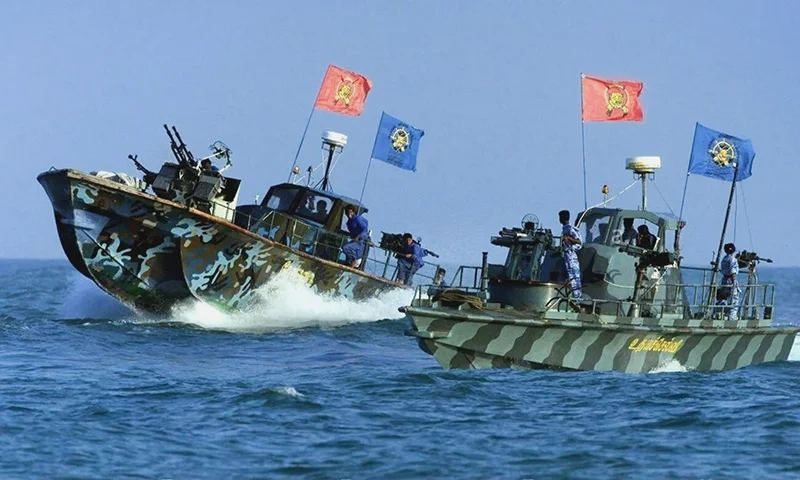
Sea Tigers
Carl Gustaf 84 mm recoilless gun was named after Carl Gustaf Stads Gevärsfaktori, which, initially, produced it. Sweden later developed the 84mm shoulder-fired recoilless gun by the Royal Swedish Army Materiel Administration during the second half of 1940s as a crew served man- portable infantry support gun for close range multi-role anti-armour, anti-personnel, battle field illumination, smoke screening and marking fire.
It is confirmed in Wikipedia that Carl Gustaf Recoilless shoulder-fired guns were used by the only non-state actor in the world – the LTTE – during the final Eelam War.
It is extremely important to check the batch numbers of the recently recovered three launchers to find out where they were produced and other details like how they ended up in Batticaloa, Sri Lanka?
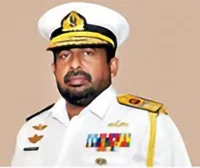 By Admiral Ravindra C. Wijegunaratne
By Admiral Ravindra C. Wijegunaratne
WV, RWP and Bar, RSP, VSV, USP, NI (M) (Pakistan), ndc, psn, Bsc (Hons) (War Studies) (Karachi) MPhil (Madras)
Former Navy Commander and Former Chief of Defence Staff
Former Chairman, Trincomalee Petroleum Terminals Ltd
Former Managing Director Ceylon Petroleum Corporation
Former High Commissioner to Pakistan
-

 Features4 days ago
Features4 days agoMy experience in turning around the Merchant Bank of Sri Lanka (MBSL) – Episode 3
-

 Business5 days ago
Business5 days agoZone24x7 enters 2026 with strong momentum, reinforcing its role as an enterprise AI and automation partner
-

 Business4 days ago
Business4 days agoRemotely conducted Business Forum in Paris attracts reputed French companies
-

 Business4 days ago
Business4 days agoFour runs, a thousand dreams: How a small-town school bowled its way into the record books
-

 Business4 days ago
Business4 days agoComBank and Hayleys Mobility redefine sustainable mobility with flexible leasing solutions
-

 Business23 hours ago
Business23 hours agoAutodoc 360 relocates to reinforce commitment to premium auto care
-

 Business5 days ago
Business5 days agoHNB recognized among Top 10 Best Employers of 2025 at the EFC National Best Employer Awards
-

 Editorial7 days ago
Editorial7 days agoAll’s not well that ends well?


